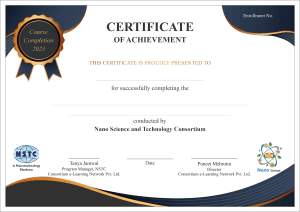
Introductory Program In Nanotechnology
Nanotechnology, Introductory Program, Foundation, Basics, Applications, Science, Technology, Education, Innovation, Exploration.
- Introduction to Nanotechnology: Explore foundational principles.
- Nanomaterial Fundamentals: Learn properties and synthesis methods.
- Nanoscale Engineering: Gain insight into design and fabrication.
- Biomedical Applications: Discover nanotech in medicine.
- Environmental Impact: Understand nanotech’s role in addressing pollution.
- Nanoelectronics and Photonics: Delve into device design.
- Nanomedicine Techniques: Explore disease diagnosis methods.
- Safety and Ethics: Understand risks and ethical considerations.
- Career Pathways: Gain insight into nanotech careers.
Aim: The Program in Nanotechnology aims to provide participants with a thorough understanding of nanotechnology principles, applications, and methodologies. Through a blend of theory and hands-on experience, it equips individuals with the skills needed to navigate this multidisciplinary field. Covering topics like nanomaterials, nanoscale engineering, biomedical applications, and environmental impact, the program fosters a deep comprehension of nanotech’s role in addressing complex challenges across various sectors. Ultimately, it prepares participants for careers in research, industry, and academia, empowering them to contribute to nanotechnology advancements and its diverse applications.
Program Objectives:
- Understand fundamental principles and concepts of nanotechnology.
- Explore properties, synthesis methods, and characterization techniques of nanomaterials.
- Learn to design, fabricate, and manipulate nanoscale structures and devices.
- Investigate nanotechnology’s applications in biomedicine and environmental remediation.
- Analyze the ethical, legal, and societal implications of nanotechnology deployment.
- Gain practical experience through hands-on laboratory sessions in nanomaterial synthesis.
- Develop skills in evaluating nanomaterial risks and adhering to safety protocols.
- Acquire knowledge of nanoelectronics, nanophotonics, and nanomedicine techniques.
- Understand career pathways and opportunities in the field of nanotechnology.
- Prepare for roles in research, industry, and academia by integrating theoretical knowledge with practical experience.
What you will learn?
Introduction to Nanotechnology Vol. 1
Module 1: Fundamentals of Nanotechnology
- Unit 1- Historical Aspects of Nanotechnology
- Unit 2- What are Nano & Nanometer?
- Unit 3- Nanoscience & Nanotechnology- Definitions & Components
- Unit 4- Modern Aspects of Nanotechnology
- Unit 5- How will Nanotechnology Affect us?
Module 2: Nanotechnology in Various Sectors
- Unit 1- Nanotechnology in Agriculture / Food
- Unit 2- Nanotechnology in Electronics
- Unit 3- Nanotechnology in Textiles
- Unit 4- Nanotechnology in Construction
- Unit 5- Nanotechnology in Energy
- Unit 6- Additional Application of Nanotechnology in Medicine & Pharmaceuticals
- Unit 7- Nanotechnology in Automobiles
- Unit 8- Nanotechnology in Environment
- Unit 9- Nanotechnology in Sports
- Unit 10- Nanotechnology in Chemicals and Paints Introduction to Nanotechnology Vol. 2
Module 3: Research & Development in Nanotechnology
- Unit 1- Research & Development in Nanotechnology
Module 4: Indian Nanotechnology Perspective
- Unit 1- Role of Government Promoting Nanotechnology
- Unit 2- Role of Industries Promoting Nanotechnology
- Unit 3- Other Activities
- Unit 4- Chronology of Major Conferences
- Unit 5- Major Universities /Institutes/Companies
Module 5: Global Nanotechnology Perspective
- Unit 1- Nanotechnology in Asia
- Unit 2- Nanotechnology in Europe
- Unit 3- Nanotechnology in Africa
- Unit 4- Nanotechnology in Australia
- Unit 5- Nanotechnology in North America
- Unit 6- Nanotechnology in South America
Get an e-Certificate of Participation!

Intended For :
Graduates, Post Graduates, Research Scholars, Academicians, Industry Professionals of biology, chemistry, physics, engineering, medicine, or environmental science
Career Supporting Skills
